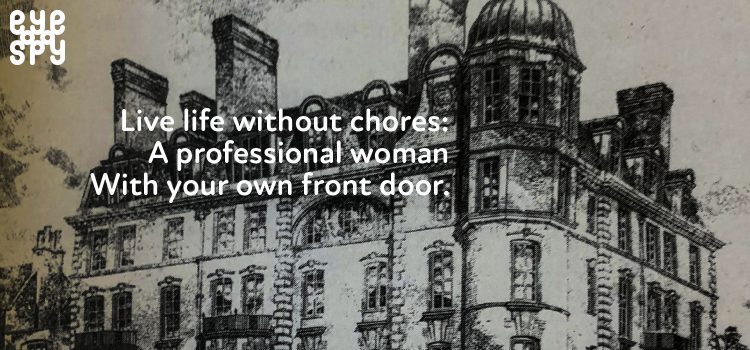
What a hot spring it had been, with no rain in London for sixty days between mid-March and mid-May, and only a few showers since, wafting us limply towards this evening in late June, the year 1893. The city in general suffers in a state of swollen airlessness; Chenies Street in particular is shimmering in the heat, the thin shade cast by its newly-built mansion blocks serving only to accentuate the warmth radiating from brick and stone.
Here, home at last, comes Miss Verity Fodder, hurrying up the steps to the door of the Chenies Street Chambers. As she steps into the cool shade of the tiled hall she thinks—I must water the plants—but she’s late for supper so she goes instead to the club room downstairs. The dining hours were advertised as generous, but in practice Mrs. Ireland, caretaker, prefers residents to eat together at 6:15pm sharp. She is not a decorated veteran like her husband, but she exhibits a certain military flair in keeping rules on ‘her girls’. Whether ‘her girls’ – professional independent women all – are fit subjects of such rules is a topic of some contention. ‘They treat us,’ someone quipped to Verity when she moved in, ‘like a mix between lunatic paupers and rebellious schoolgirls.’
In the club room sits Miss Sergeant, novelist, looking uncomfortable in a chair by an open window, hoping for a breeze. Miss White is reading aloud, as she often does, from the Englishwoman’s Review. Miss Reason and Miss Paddon peer over her shoulder. ‘…Miss Sergeant’s fireplace is draped with wine-coloured brocaded velvet curtains…’ she looks up as Verity comes in, ‘Verity, sweet maiden, just in time, our Gala Day—and Adeline’s exquisite rooms—have made it to the Review. Even you get a mention!’
Verity is too hot to be interested. She pours a glass of water from a jug. She thought the Gala was a brilliant idea at first: a chance to show society how women can live perfectly well on their own terms—with their own front doors! And she had hoped, in moving to the Chambers, to join a community of women at the forefront of change, to spend her time discussing how best to advance the cause of women’s suffrage. Instead, there had been endless chatter on how best to arrange one’s cushions for the Gala Day. The liberation the Chambers stood for was of less interest, it seemed, than how they might be decorated. The day itself had passed without incident, deemed a success by all, and mythologised by Miss White for many weeks now.
‘Here you are,’ says Miss White, running a finger over the page, ‘among the artists and musicians is “a fair and gentle girl, who modestly tells you that she is a high-school mistress, and, with kindling eyes, adds, ‘there is a glorious independence in earning one’s own bread,’” Oh Verity you are a darling,’ says Miss White, turning wistfully to the window, ‘how I envy the eagerness of youth.’
Galen O’Hanlon
Image: The Builder 9 Nov 1889
